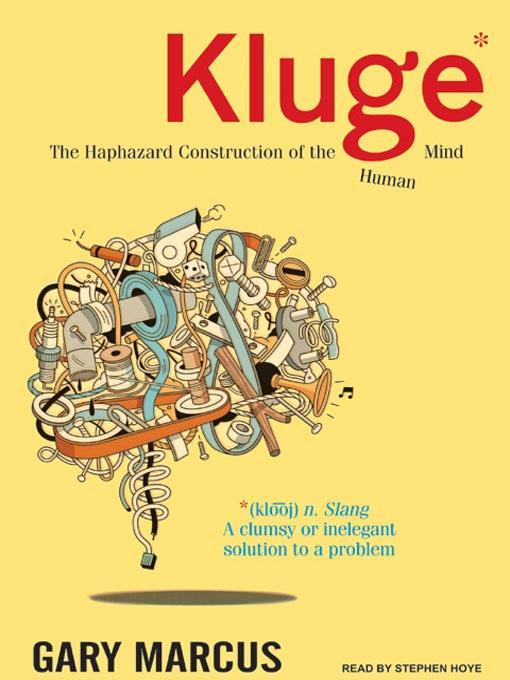
Kluge
The Haphazard Construction of the Human Mind
فرمت کتاب
audiobook
تاریخ انتشار
2008
نویسنده
Stephen Hoyeناشر
Tantor Media, Inc.شابک
9781400177516
کتاب های مرتبط
- اطلاعات
- نقد و بررسی
- دیدگاه کاربران
نقد و بررسی

Our minds, say author Gary Marcus, are made up of "kluges"--haphazard collections of parts that manage to work in spite of themselves. Examining some key elements of our mind--memory, belief, decision making, language, and happiness--Marcus attempts to prove his theory that a well-designed mind would work better and, especially, make more sense. Alas, in this too-brief book, Marcus only scratches the surface with anecdotes rather than giving any solid theories. In addition, the deliberate, pedantic narration by Stephen Hoye makes listening to this book a chore. Hoye's sarcastic tone further confuses the anecdotes that make up this book, suggesting that they aren't to be taken seriously. This reading makes a less-than-interesting book a tough and uninteresting listen. K.M. (c) AudioFile 2008, Portland, Maine

February 11, 2008
Why are we subject to irrational beliefs, inaccurate memories, even war? We can thank evolution, Marcus says, which can only tinker with structures that already exist, rather than create new ones: “Natural selection... tends to favor genes that have immediate advantages” rather than long-term value. Marcus (The Birth of the Mind
), director of NYU's Infant Language Learning Center, refers to this as “kluge,” a term engineers use to refer to a clumsily designed solution to a problem. Thus, memory developed in our prehominid ancestry to respond with immediacy, rather than accuracy; one result is erroneous eyewitness testimony in courtrooms. In describing the results of studies of human perception, cognition and beliefs, Marcus encapsulates how the mind is “contaminated by emotions, moods, desires, goals, and simple self-interest....” The mind's fragility, he says, is demonstrated by mental illness, which seems to have no adaptive purpose. In a concluding chapter, Marcus offers a baker's dozen of suggestions for getting around the brain's flaws and achieving “true wisdom.” While some are self-evident, others could be helpful, such as “Whenever possible, consider alternate hypotheses” and “Don't just set goals. Make contingency plans.” Using evolutionary psychology, Marcus educates the reader about mental flaws in a succinct, often enjoyable way.

September 15, 2008
Evolution seems a rushed process in which traits and attributes of humanity have been pieced together to make a functioning but far from perfect or rational being. Marcus explores the ways in which the human mind, while magnificent in its overall ability, still stumbles on several points. Focusing on areas such as memory, decision making and language, Marcus keenly identifies the makeshift devices humans have created in order to contend with what he describes as "evolutionary inertia." Stephen Hoye traverses the complicated aspects of the book with ease, his melodious voice providing just the right emphasis for listeners to understand Marcus's major points. Yet his delivery misses some of the more humorous elements of the book. And Hoye's lingering voice, which seems to trail off after the end of a sentence, may be good for poetry, but can wear on the nonfiction listener. A Houghton Mifflin hardcover (Reviews, Feb. 11).
Copyright 2008 Library Journal, LLC Used with permission.

























دیدگاه کاربران